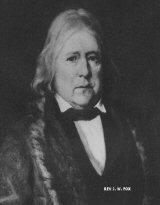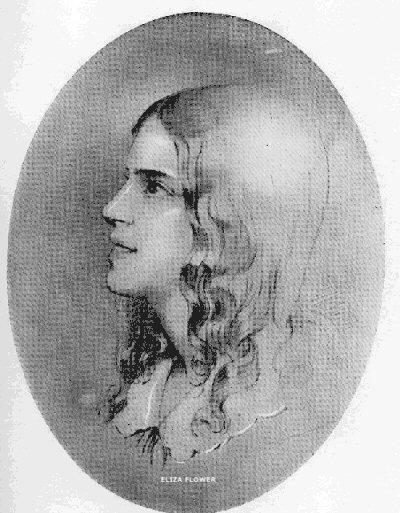
EBENEZER ELLIOTT
(1781 - 1849)
Radical Friends: Rev W.J. Fox, Eliza Flower &
Elliott
(and a few others)
Some of Ebenezer Elliott's early poems were first published in a journal called the "Monthly Repository," often known just as the " Repository." In its early years, the periodical was the mouthpiece of the Unitarian movement. The Corn Law Rhymer was of the Unitarian faith, and so it is not a surprise that Elliott's poems should appear in the magazine. The Unitarians tended to communicate with fellow believers - a principle which today we would call networking.
Given the above, it was almost inevitable for eminent figures in the Unitarian community to be acquainted: this certainly happened with Rev W. J. Fox and Elliott.
William Johnson Fox (1786-1864) was an Unitarian who contributed to the Repository which he went on to purchase in 1831. Fox had been born in 1786 & educated at Homerton Theological College where one of his tutors was Dr John Pye Smith who is also inked to Elliott. Fox & the Corn Law Rhymer are of similar age, of the same religion & both influenced by the same minister: Rev Dr John Pye Smith. The latter was either Congregationalist or Unitarian, but most probably the latter, since in 1823 Elliott wrote to the doctor about misgivings the bard was having over his religious beliefs.

Rev W. J. Fox
At the time when Fox bought the "Repository" in 1831, he did not actually know Elliott. However, the "Corn Law Rhymes" appeared the same year as Fox's purchase. The following year, 1832, Fox praised the poems in an article he published in the "Repository" called "The Poor and Their Poetry."* Since Fox was a radical who strongly supported repeal of the Corn Laws, he was quickly in touch with the Corn Law Rhymer asking him to submit poems for publication in the journal. The Poet of the Poor replied on Jan 9 1833 saying:- "I have very little time for writing, and much less ability than you have the kindness to imagine. I wrote the Corn Law Rhymes passionately, with an honest and useful purchase. This, I believe, is the whole secret of my supposed genius, but though I cannot write anything that will do credit to your pages, I hold you pledged to take what I may send you with consideration."
*In
the article, Fox makes the following comments: 'Both in this poem
(Village Patriarch) and in "Love," there is sustained excellence of
versification, thought and imagery, which is very unusual. He never
drops, as the songs of Burns do, from the verse which was inspired to
the verse which is manufactured. His mind is healthful and vigorous;
always knows its work, and does its work. His stories and his sketches
of character, both of which are frequently introduced, are so good,
that we only regret not having space to give specimens of them.' Fox
also refers to 'The beauty of his descriptions.'
Following the contact between the two men, it is said that Rev Fox conceived a profound esteem for the author of the "Corn Law Rhymes." For example, Fox made an interesting remark about the Corn Law Rhymer:-
As well as being a minister & a journalist, William Johnson Fox was a literary critic & a public lecturer of outstanding repute. A speciality was women's suffrage, but he also campaigned for working class education and for free libraries. With these enthusiasms, he had therefore some common ground with the Corn Law Rhymer. Fox also gave talks on drama & poetry - two more interests he shared with Elliott.
Like the Poet of the Poor, Fox was at the front of the attack on the Bread Tax or Corn Laws. Yet while Fox was against the Bread Tax, he was not for free trade asserting that when Free Traders shouted "Cheap Bread," they really meant to shout: "Low Wages." A view with which the Bard of Free Trade may not have concurred. Fox was closely involved with the Anti-Corn Law League & wrote leaders for the campaigning Morning Chronicle; he even attended the great Chartist Meeting in Westminster Palace Yard in 1838, but, unlike Elliott, he did not speak to the meeting. With Chartism, Rev Fox had similar views to the Corn Law Rhymer, being against the physical force Chartists and an opponent of the militant Feargus O'Connor.
As well as owning the Repository, Fox made contributions to the Westminster Review, the True Sun, the Daily News & the London Times. Later in life, the radical minister & journalist turned to Parliament & was very busy as MP for Oldham from 1847-62.
In 1834, Fox was very close to be dismissed from his ministry owing to a scandal over a young woman. For a long time, Fox had been very close to Eliza Flower (1803-46), a distinguished composer, organist, hymn writer and a talented musician and, of course, of the Unitarian faith. In 1834 Fox & his wife separated, and the reverend gentleman set up home with Eliza who was 17 years his junior. Like Fox, Eliza loved literature. She became a friend of Robert Browning who she persuaded to write for Fox's "Repository". Shelley was another acquaintance - he was besotted with Eliza & wrote a poem called "Incondita" in which the character Pauline was Shelley's depiction of Eliza.

Eliza Flower 1803 - 46
Eliza had a talented sister called Sarah Flower (1805-1848). Sarah was
a poet and hymn writer of some distinction. She was better known as
Sarah Flower Adams after marrying William Bridges Adams in 1834. (See below for more about William Bridges Adams).
Elliott wrote a poem in 1810 about the death of Eliza Flower's mother who was also called Eliza Flower! For the text of the poem "Elegy On Eliza" and for further notes on the Flower family, please visit NewPoems2 on this site.
In Elliott's letter to Eliza Flower, the poet lamented: "How is it that I cannot write a line worthy of Pemberton? It shall not be long before I join his lovely name with some scenes of our happy wanderings." When Pemberton visited Sheffield in 1838 to give a lecture at the Mechanics' Institute, he was taken out walking by Elliott. One of the places they visited was Roche Abbey, near Rotherham. Their visit is commemorated in the poem Elliott wrote called "Roch Abbey" in which Pemberton is praised as:
To truth a martyr, hated and belied;
Of freedom's cause a champion true and tried.
On the death of Pemberton, the Corn Law
Rhymer composed a poem about his friend called "Poor Charles“- it is one of
Elliott's better poems. "Poor Charles" was set to music by the talented Eliza Flower.
Charles Reece Pemberton had an unusual life. Born in Wales, he attended an Unitarian school in Birmingham but ran away from home ending up in Liverpool. Here the unfortunate young man was press-ganged & then served at sea for seven years before changing tack to become an actor & theatre manager in the West Indies. In 1827 he was back in England where he established himself as a Shakespearean actor; his growing reputation leading him to lecture on Shakespeare & to give recitals at mechanics' institutes.
Pemberton had been brought to Elliott's
attention by Francis Place , the noted radical who helped draft the
People's Charter. For brief notes on Place, see the list of Elliott's Friends and Acquaintances.
Naturally, Elliott & Place were acquainted. For instance, they worked together in establishing the London Anti-Corn Law League; they sometimes appeared on the same platform at meetings & they were writing letters to each other in 1834. There was another connection between the two men, albeit somewhat circuitous!
William Bridges Adams (1797-1872) was a railway man who
visited the Corn Law Rhymer in October 1849 with Samuel Smiles
, author of the
famous "Self Help." Adams' first wife was the daughter of Francis Place.
Everybody knew each other! The railway man's second
wife was Sarah Flower, sister to the famous Eliza Flower (see above).
His next wife was the mysterious Ellen Rendall. Adams appropriately
was yet another contributor to the "Repository;" which seems
to tie things together quite neatly. For brief notes on Smiles, see the list of Elliott's Friends and Acquaintances.
In August 1844, Elliott wrote to the writer & Chartist John Watkins about Fox. Watkins, who was in five years time to marry Elliott's daughter, was also on the Chartist lecture circuit. In a curiously phrased remark the bard wrote: "Did you ever hear Fox, or see him? He is a portmanteau set on end, full of goodness, eloquence, and genius." Obviously Elliott had a high regard for Fox.
Soon after the visit of William Bridges Adam & Samuel Smiles to see Elliott, the Poet of the Poor died at his home near Great Houghton. On hearing the news about the bard's demise, Rev Fox made the following comments about the poet:-
"He was a man to welcome and to fraternise with, whether in the uproar of the hustings or in the devotion of the tabernacle; whether in the crowded mart or in the country ramble; a man who showed that the poet could yet be the patriot; that poetry was not too soft and squeamish a thing to be brought into contact with the rough and stern realities of existence; but who, while denouncing oppression and wrong, and that in the sturdiest and most earnest manner, yet ever had a heart and an eye for all that is true, and beautiful, and good. Various instances might be adduced from his writings that religion especially thrives in the poetic temperament."
After the death of the Poet of the Poor, John Watkins approached Fox (and Thomas Carlyle) to see if either would write a biography of Elliott. Both declined: Fox through pressure of work while Carlyle commented that he had never met the poet. In the end, Watkins wrote the biography of his father-in-law; something he had promised to do.
Looking at Elliott and his acquaintances, it is astonishing how inter-connected they all seemed to be: their common interests & beliefs seem to have brought them together. This networking must have made an important contribution to the spread & acceptance across the country of radical ideas. How did they manage it all without a telephone, without a mobile, without the Internet & without email!
To return to Ebenezer Research
Foundry, please strike the anvil

To jump to Elliott's home page, please click here